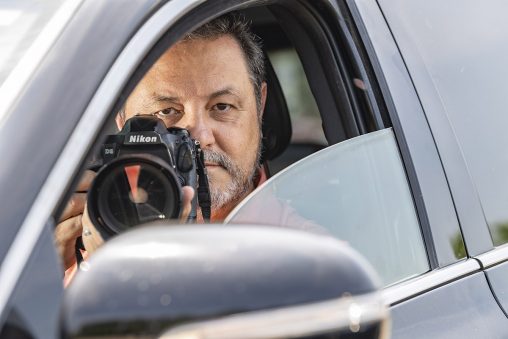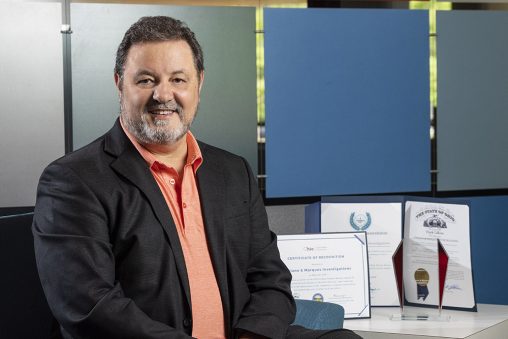
Wright State alumnus Francisco Marques started working as a private investigator in 1990 in Barcelona, Spain, and continued his work when he moved to the United States in 2012.
Wright State University alumnus Francisco Marques was recently awarded the 2023 La Mega Hispanic Business Award for Best Professional Services Business in the Southern Ohio Area.
Marques, who has worked as a professional private investigator since 1990, is the owner of the Centerville-based private investigation company, Cipriano and Marques, which he runs with his wife, Michelle Cipriano a senior lecturer of Spanish in Wright State’s School of Social Sciences and International Studies.
A native of Spain, Marques grew up in the northwest province of Leon. He moved to Barcelona as a teenager and eventually to the United States in 2012 to be with Cipriano.
Marques earned a Bachelor of Arts in Spanish and a Master of Humanities, with a concentration in African American studies, from Wright State.
Cipriano and Marques met in 1984 when she was an exchange student visiting Spain. She said Marques was dressed as a troubadour playing music on the street as part of a tuna, a traditional musical group that dates to 13th century Spain and Portugal. Cipriano and her host sister stopped to listen and struck up a conversation with the group.
She and Marques became friends and corresponded for decades after she returned to the United States. Eventually, they were reunited when Cipriano took a group of Wright State students to Spain.
Marques decided to continue his work as a private investigator and became licensed in Ohio in 2013. He got into private investigation work by chance.
“When I moved to Barcelona, I started working for a security company and rose through the ranks. After a while I decided to go to school to pursue a degree in criminology at the University of Barcelona,” said Marques.
He said becoming a licensed private investigator in Spain requires a university degree in the field of private investigation and recognized by the Spanish Ministry of the Interior.
Specializing in familiar, corporate and insurance cases, he said his job is not always as exciting as television and movies make it out to be. On a good day, no one will ever know he was there. And in the early days without all the advances in technology he has access to now, he said it could also be quite slow going.
“There is a lot of legwork, a lot of surveillance and just sitting around and waiting for people to leave their homes,” said Marques. “I didn’t get my first cellphone until 1992, and when I did it was one of those huge Motorola phones. So, before then if I had to make a phone call in the field, I had to find a public payphone.”

Francisco Marques, who earned a bachelor’s degree in Spanish and a Master of Humanities from Wright State, was honored for his work as a professional private investigator.
He said that technology has made a difference. For example, he still uses a camera for taking surveillance photos but said a digital camera makes the process quicker and less expensive.
“In this business, one of the most important skills you need to learn is how to take a good photo,” he said. “When I first started, I had to have every photo I took developed. Sometimes I would take four or five rolls of film and that could get expensive.”
Technological advances have also helped him to become more inconspicuous when doing surveillance, especially in a crowd. One of the apps he uses allows him to take photos or record video, while appearing to be playing a game or on Facebook.
“Sometimes I use a cellphone if I am doing surveillance indoors, like at a bar. People get nervous and suspicious when they see someone with a real camera indoors,” said Marques. “They wonder why you are there. Since everyone is on their phone these days and it allows me to be subtler.”
Marques recalled visiting Washington, D.C., for a conference and visiting a museum while he was there. Since his cellphone had died, he took his camera to the museum but didn’t have time to drop it off at the hotel before he went out to dinner.
“Some man came up to me and seemed worried, wondering if I was paparazzi or something,” said Marques.
Though ideally Marques would rather that no one noticed him doing his job, it isn’t always possible. In those instances, he said it is important to learn to think on your feet and use the resources you have available. Learning to be comfortable with interacting and communicating with people from all walks of life and learning how to blend in is an essential skill set. He also always informs local police when he is doing surveillance in an area to avoid misunderstandings.
“You can work in a very luxurious neighborhood one day and a very poor neighborhood the next. You need to learn to be very open-minded and always treat people with kindness and respect,” he said.
Marques has worked all over Europe and the United States and has managed investigations in many countries of Latin America. Marques is a member of the World Association of Detectives, the Council of International Investigators and the Ohio Association of Security and Investigation Services.

 Wright State names Rajneesh Suri dean of Raj Soin College of Business
Wright State names Rajneesh Suri dean of Raj Soin College of Business  ‘Only in New York,’ born at Wright State
‘Only in New York,’ born at Wright State  Wright State president, Horizon League leaders welcome new commissioner
Wright State president, Horizon League leaders welcome new commissioner  Wright State celebrates homecoming with week-long block party
Wright State celebrates homecoming with week-long block party  Wright State baseball to take on Dayton Flyers at Day Air Ballpark April 15
Wright State baseball to take on Dayton Flyers at Day Air Ballpark April 15 